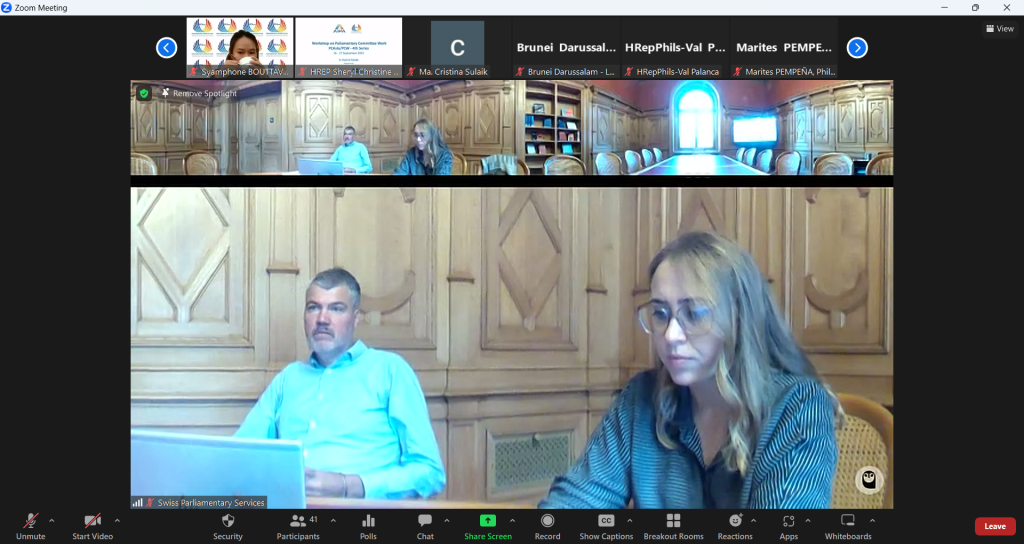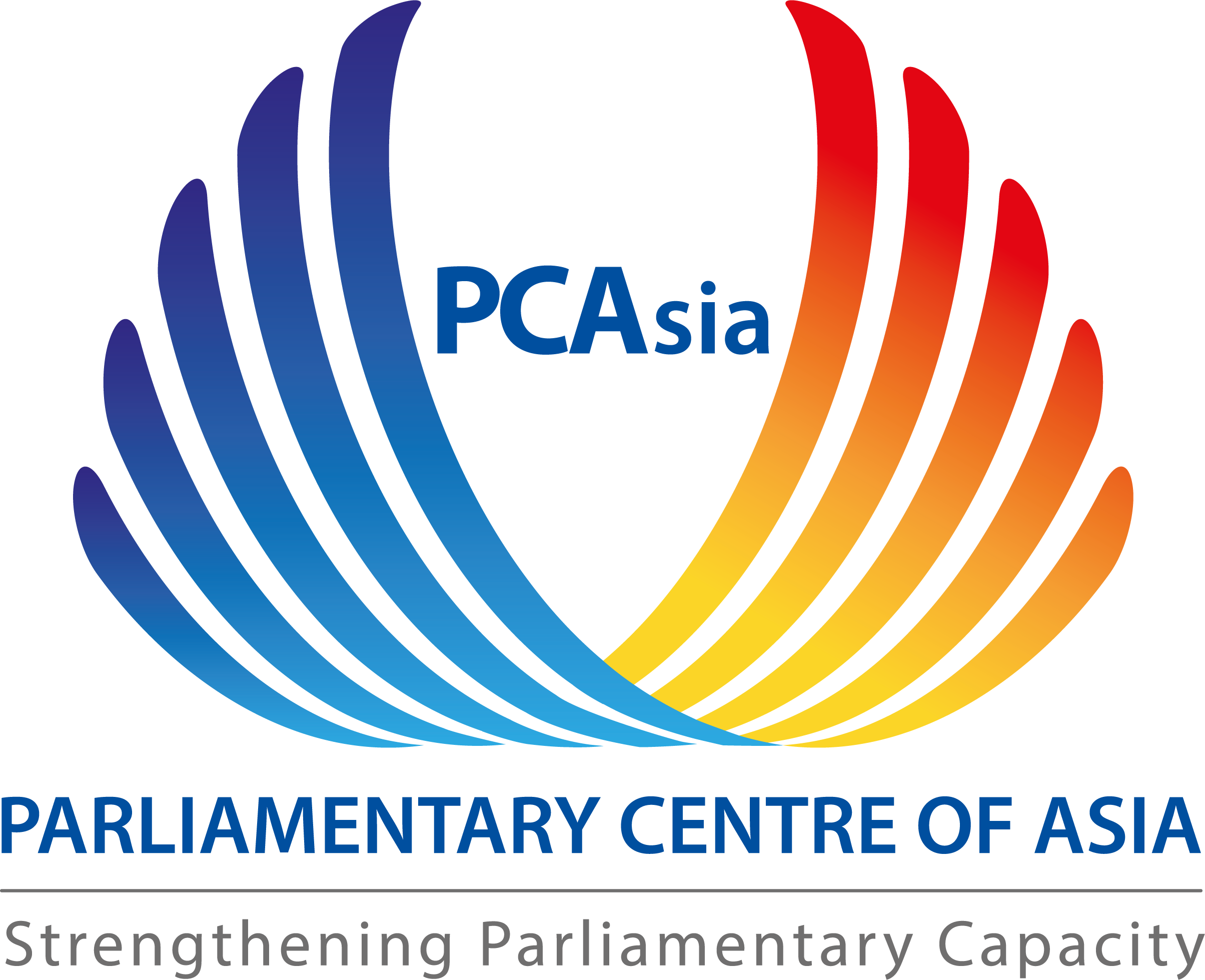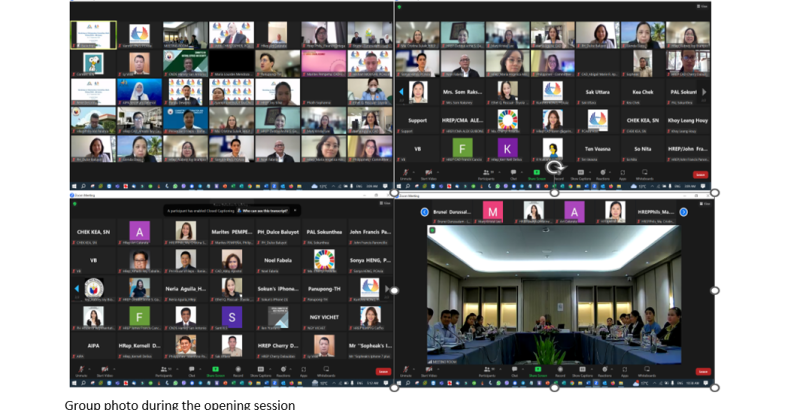Responding to feedback from participating AIPA Member Parliaments, the objectives of the fourth series of the PCAsia Workshop on Parliamentary Committee Work were updated to include a number of important subjects. Among these were knowledge building on the conduct of parliamentary committee work across legislatures, knowledge sharing in performing parliamentary committee administrative and technical tasks, and opportunities for networking and exchanging good practices between parliamentary practitioners in the framework of North-South and Regional/South-South cooperation.
The workshop was undertaken from 26 to 27September 2023 in hybrid mode – with face-to-face training for participants in Vientiane, Laos, and online for those in the region. It was attended by over 60 participants from the Parliaments of Brunei, Cambodia, Laos, the Philippines, Thailand, Canada, and Switzerland. The workshop built upon the past three series, based on the need for increased capacity of staff of AIPA Member Parliaments to perform committee work.
In her opening remarks, Her Excellency Ar. Siti Rozaimeriyanti Dato Haji Abdul Rahman, AIPA Secretary General, expressed her sincere appreciation towards the distinguished guest speakers and participants, highlighting AIPA’s continued support for the workshop.

Mr John Christopher, PCAsia Capacity Development Director, then gave brief remarks about PCAsia and proceeded with the first presentation of the workshop, which introduced the Parliamentary Committee System at the National Level in the Canadian House of Commons.
In the afternoon session, presentations on Parliamentary Committees in the Swiss Parliament were delivered by two guest speakers from the Swiss Parliamentary Services – Mr Michael Ruch, Deputy Secretary of the Committees for Environment, Spatial Planning, and Energy and Mrs Marija Stosic, Head of Parliamentary Technical Cooperation. The session continued with a presentation on the Parliamentary Committee System in the Legislative Assembly of Ontario, Canada. The presentations received numerous questions, generating interesting answers and initiating many points of discussion among participants.


Presentations made by the Swiss Parliament and the Legislative Assembly of Ontario, Canada
On the second day, the representatives from the Parliaments of Brunei, Cambodia, Laos, the Philippines, and Thailand were invited to share their experiences about the work of parliamentary committees in their respective parliaments such as the role of committees and committee secretariat, the work of committee staff, the tasks of the committee clerk, and the importance of committee researchers, among others. The morning session concluded with several thought-provoking questions, resulting in informative discussions.

Engagement of participants during Q&A sessions
The afternoon session began with presentations from the AIPA Secretariat giving an Overview of the Work and Procedures of AIPA Standing Committees, which encouraged participants to engage in active discussions and exchanges.
In the final session dedicated to feedback, the participants provided their comments on important points they learned, which included aspects such as the improved understanding of the various structures, roles, and procedures among the committees in the participating countries, and the significance of informal practices in compliment to the formal ones. Participants also raised points requiring more clarification and shared suggestions for ways to improve the substance and organisation for the upcoming series.

Mr John Christopher responded by recalling the rich exchanges, curiosity, and spirit of sharing that took place during the two-day workshop. He noted with optimism the prospect of further exchanges, to be facilitated through the PCAsia Alumni directory, which will be soon available.

Mr John Christopher, Capacity Development Director concluded the workshop
The workshop officially concluded with closing remarks by Mr Mario Pandu Dewono, PCAsia Deputy Director, who acknowledged the contributions, and participation of stakeholders—Parliaments, participants, experts, donors (SDC and SIDA), and partners, including the AIPA Secretariat with whom PCAsia has been delivering reciprocal learning opportunities to facilitate the exchange of knowledge, good practices, ideas, and experiences on parliamentary work for the parliaments in the region. He also thanked the participants for their support in the workshop’s evaluation process, noting that the lessons learnt will help PCAsia in its ongoing mission to develop the capacity of Parliaments in Southeast Asia.

Mr Mario Pandu Dewono, PCAsia Deputy Director delivered closing remark

